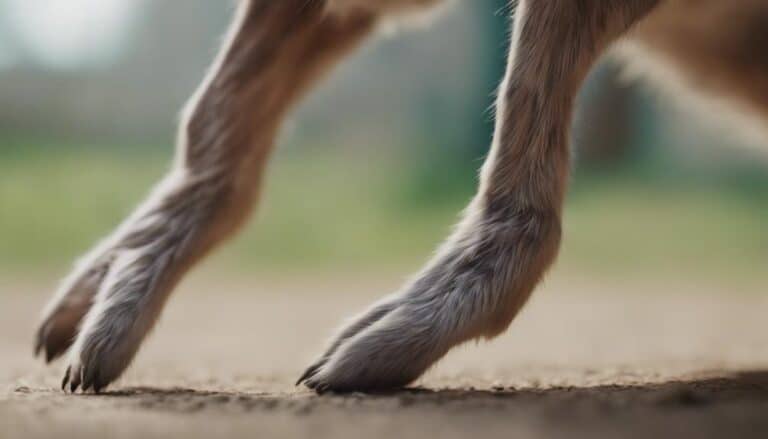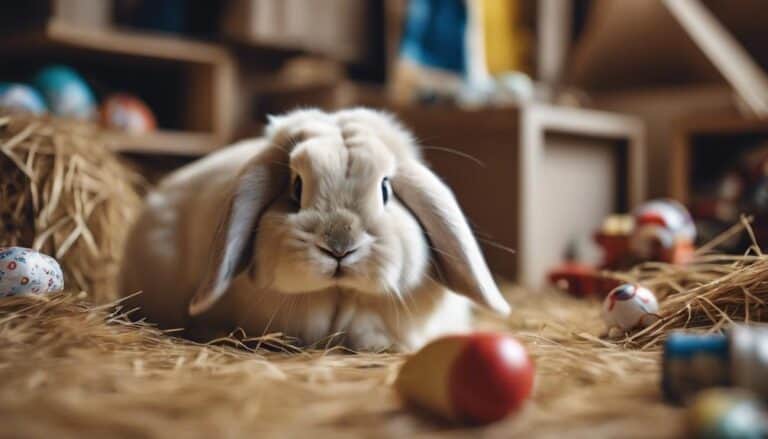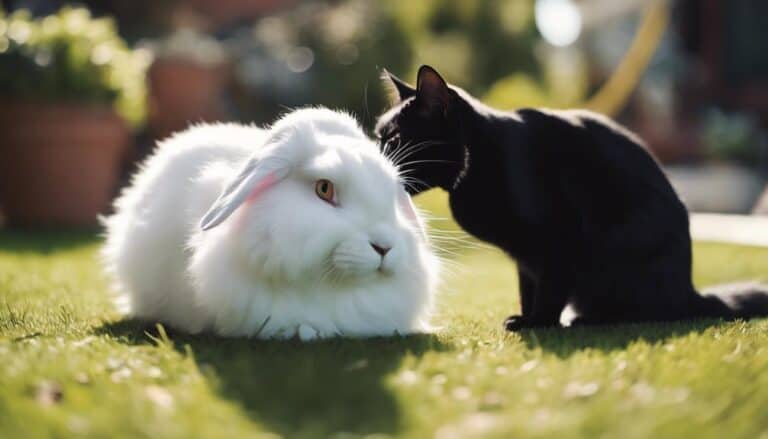If you've ever wondered whether bunnies can scratch, the answer might surprise you. While these fluffy creatures seem gentle, their adorable appearance can be deceiving when it comes to their sharp little claws.
Discovering how to handle bunny scratches and what triggers their scratching behavior is essential for maintaining a harmonious relationship with your furry friend. Understanding the nuances of bunny behavior can shed light on the possibility of being scratched and how to navigate this aspect of bunny care.
Contents
- 1 Key Takeaways
- 2 Understanding Bunny Scratching Behavior
- 3 Factors Influencing Bunny Scratching
- 4 Risks of Bunny Scratches
- 5 Preventing Bunny Scratches
- 6 Handling Bunny Scratches
- 7 Training Bunnies Not to Scratch
- 8 Managing Bunny Scratch Incidents
- 9 Can Bunnies That Scratch Be Aggressive Towards Other Pets?
- 10 Frequently Asked Questions
- 11 Conclusion
Key Takeaways
- Bunny scratching can be due to stress, territorial marking, or grooming needs.
- Scratching is a form of communication and can signal discomfort or threat.
- Bunny scratches can transmit infections, requiring prompt wound care and medical attention.
- Prevent scratches by trimming nails, using handling gloves, and understanding bunny body language.
Understanding Bunny Scratching Behavior
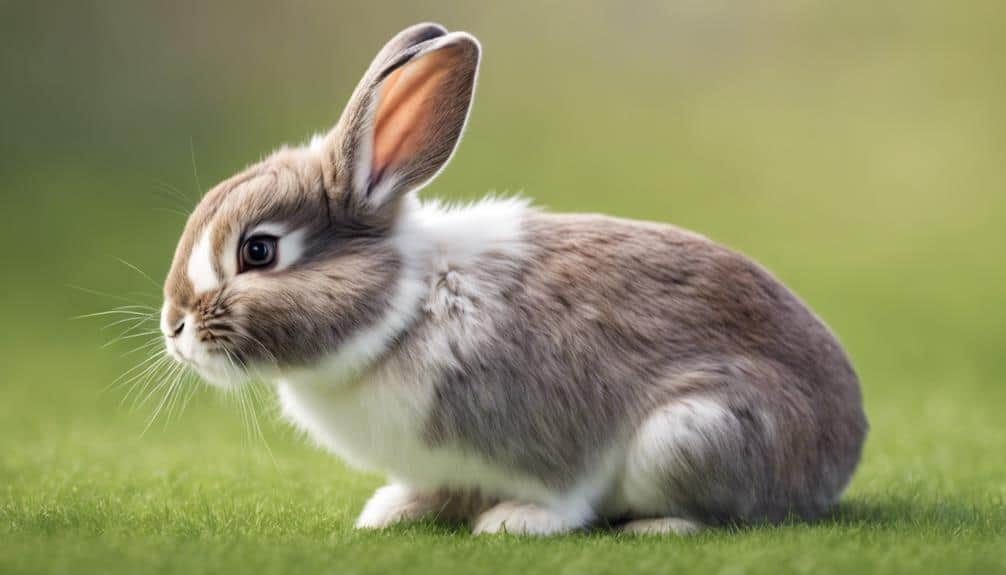
When observing bunny scratching behavior, it's critical to comprehend the various motivations behind this action to guarantee a harmonious interaction with your rabbit. Bunnies may scratch for a variety of reasons, such as feeling threatened, stressed, or when asserting dominance. Additionally, scratching can serve as a form of communication and territorial marking for rabbits, indicating their boundaries or expressing their emotions. Domestic bunnies may also scratch accidentally during play or grooming, so understanding the context in which the behavior occurs is crucial.
To prevent aggressive behavior stemming from bunny scratching, proper training, socialization, and handling techniques are key. By providing your rabbit with the necessary training and socialization, you can help minimize the risk of scratches. Understanding your bunny's body language and cues can also aid in preventing unwanted scratching incidents. By fostering a positive and secure environment for your rabbit, you can promote a healthy and respectful relationship with your furry companion.
Factors Influencing Bunny Scratching
To understand the factors influencing bunny scratching, it's important to recognize that various reasons can contribute to this behavior in rabbits. Hormonal changes, especially in unspayed or unneutered bunnies, can lead to increased aggression and scratching tendencies.
Stressful environments or situations can also trigger rabbits to scratch as a way to cope with their anxiety. Defensive instincts are innate in rabbits, and they may scratch when they feel threatened or cornered.
Additionally, bunnies may scratch for comfort, like when they're trying to create a cozy nest or grooming themselves. Lack of training or socialization can result in inappropriate scratching behaviors.
Understanding these factors can help bunny owners address the root causes of scratching, provide appropriate enrichment, and create a safe and harmonious environment for their furry companions. By being mindful of these influences, you can help prevent bunny scratches and foster positive interactions with your pet.
Risks of Bunny Scratches
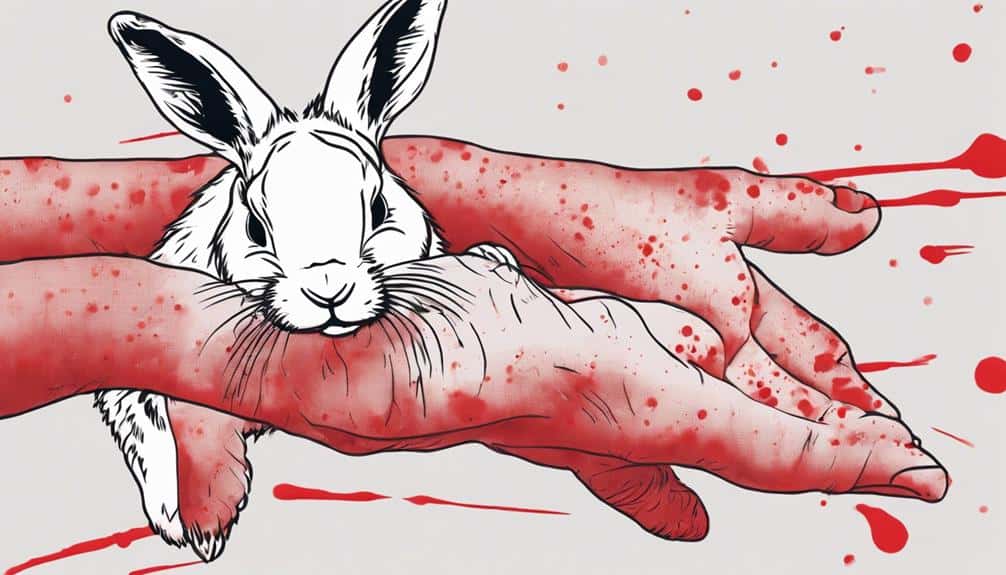
Bunny scratches pose significant risks due to their potential to transmit serious infections like tularemia, ringworm, and parasites. If a rabbit scratches you, it's important to be aware of the potential health complications that could arise.
Here are some key points to take into account:
- Infections from bunny scratches can vary from mild flu-like symptoms to severe health complications if left untreated.
- Prompt wound care is vital after a bunny scratch. Clean the wound thoroughly with soap and water, apply an antiseptic cream, and cover it with a bandage.
- Seeking medical attention is essential if you notice any signs of infection, such as redness, swelling, warmth, or discharge from the wound.
Preventing Bunny Scratches
To prevent bunny scratches:
Make sure to regularly trim your bunny's claws and wear protective gloves during handling.
Providing appropriate toys and scratching posts can also help satisfy your bunny's natural scratching instincts.
Educating children on safe bunny interactions and being attentive to your bunny's body language are important steps in avoiding accidental scratching incidents.
Trim Bunny Nails
Regularly maintaining your bunny's nail length is vital to prevent accidental scratches when handling them. To guarantee you and your furry friend stay safe and happy, consider the following:
- Trimming: Trim your rabbit's nails regularly to prevent overgrown nails that can lead to accidental scratches.
- Use Proper Tools: Invest in nail clippers specifically designed for small animals to avoid causing any discomfort or harm.
- Seek Professional Advice: If you're uncertain about how to trim your bunny's nails properly, consult a veterinarian or a professional groomer for guidance. Their expertise can help you keep your bunny's nails at the right length, reducing the risk of scratches and promoting their overall well-being.
Use Handling Gloves
When handling your bunny, ensuring your safety from scratches can be achieved by using appropriate handling gloves. Rabbits have sharp claws that can accidentally scratch you, especially if they're unfamiliar or prone to scratching. Choosing gloves made of durable material will prevent these sharp claws from penetrating the fabric.
It's essential to select gloves that fit snugly to provide dexterity while interacting with your rabbit, reducing the risk of accidental scratches. Leather or thick gardening gloves are commonly used for handling rabbits as they offer protection against scratches.
Handling Bunny Scratches
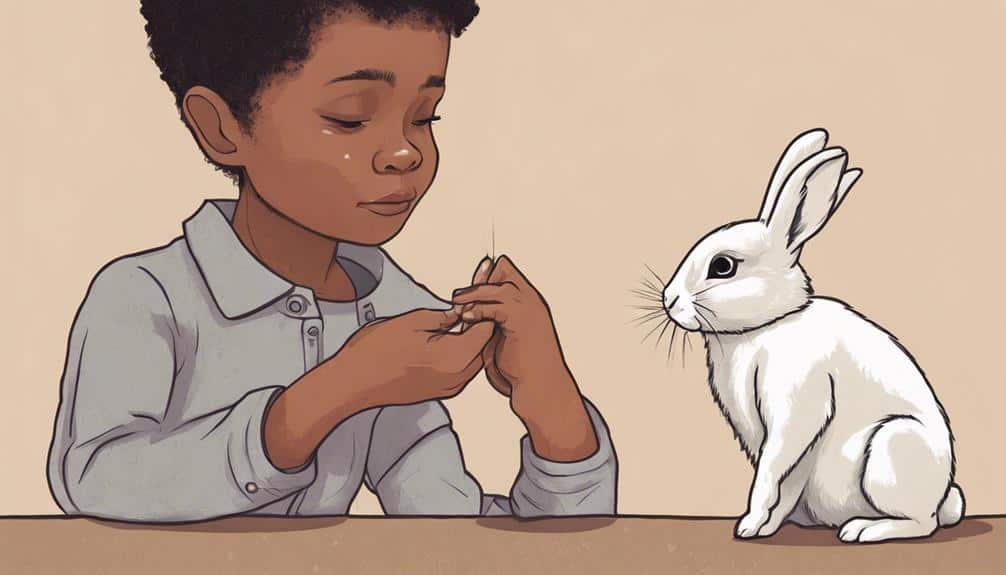
Bunny scratches can occur unexpectedly during interactions with rabbits, emphasizing the importance of understanding how to properly handle these situations. When dealing with bunny scratches, remember the following:
- Defensive Behaviors: Rabbits may scratch when feeling threatened or stressed, displaying defensive behaviors that can lead to accidental scratches.
- Natural Instinct: Scratching behavior in rabbits may stem from their natural instinct to dig and mark territory, especially if they feel their space is being invaded.
- Training Techniques: Lack of training or socialization can contribute to rabbits scratching during interactions. Proper training techniques and positive reinforcement play a pivotal role in preventing bunny scratches and promoting safe handling practices.
Training Bunnies Not to Scratch
To train bunnies effectively not to scratch, focus on reinforcing positive behaviors through consistent and gentle methods. Use positive reinforcement techniques like treats and pets to encourage good behavior and discourage scratching.
Avoid using negative reinforcement or harsh discipline, as this can lead to fear and defensive behaviors. Understand that scratching in bunnies can stem from various reasons such as stress or territorial instincts. By addressing these underlying causes, you can effectively mitigate scratching behavior.
Providing appropriate toys and enrichment activities can help keep bunnies engaged and prevent destructive scratching behavior. Consistency, patience, and regular training sessions are essential for successfully teaching bunnies not to scratch.
Managing Bunny Scratch Incidents
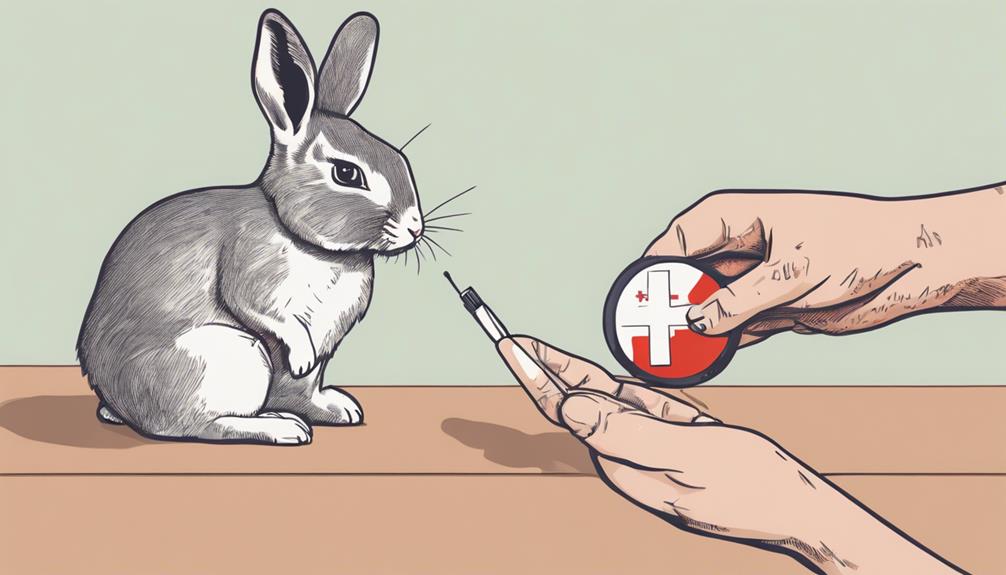
During interactions with your bunny, it's important to be mindful of potential scratch incidents and how to manage them effectively. Bunny scratches can happen during various activities like handling, grooming, or playtime.
To make sure you handle bunny scratches properly, follow these key steps:
- Immediate Cleaning: Clean the wound promptly with mild soap and water to prevent infection.
- Apply Antiseptic: After cleaning, put an antiseptic ointment to reduce the risk of bacteria entering the wound.
- Monitor for Infection: Keep a close eye on the scratch for any signs of infection, such as increased redness, swelling, or warmth around the area.
Can Bunnies That Scratch Be Aggressive Towards Other Pets?
Yes, bunnies and cats coexisting peacefully is possible, but bunnies that scratch can be aggressive towards other pets. It’s important to monitor their behavior and provide proper training and socialization to ensure a harmonious relationship between bunnies and other pets in the household.
Frequently Asked Questions
What Happens if My Bunny Scratches Me?
If your bunny scratches you, it can cause minor injuries like scratches, punctures, or scrapes due to their sharp claws. Clean the area to prevent infection. Seek medical attention for serious scratches to avoid complications.
How Do You Stop a Bunny From Scratching You?
To prevent bunny scratching, provide toys for redirection, use positive reinforcement, trim nails, and create a calm environment. Consistent training, treats for good behavior, and regular grooming can minimize the risk of accidental scratches and foster a stronger bond.
Is It Normal for Bunnies to Itch?
It is normal for bunnies to itch due to various reasons like grooming, shedding, or skin irritation. Bunny grooming, proper handling, flea prevention, and checking for skin sensitivity, common allergies, and parasites are essential for addressing itching caused by environmental triggers.
Do I Need a Tetanus Shot for a Rabbit Scratch?
If a rabbit scratch breaks the skin, there might be a tetanus risk. Rabbit nails can carry bacteria. Proper wound care is essential. Consult a healthcare provider to determine the necessity of a tetanus shot.
Conclusion
To sum up, bunnies can indeed scratch you if they feel threatened or stressed. Understanding their behavior and taking preventive measures, such as regular claw trimming, can help minimize the risks of bunny scratches.
Remember, an ounce of prevention is worth a pound of cure! By being aware of the factors influencing bunny scratching and properly handling scratch incidents, you can make sure a safe and enjoyable relationship with your furry friend.


